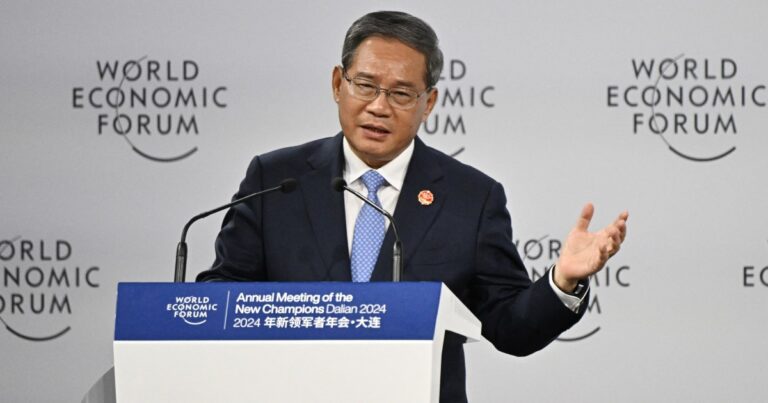Li Qiang told a World Economic Forum meeting that countries should work closely together to abandon the camps.
China’s premier has called on countries to “oppose decoupling” as economic tensions rise between Beijing and the European Union ahead of new tariffs on Chinese-made electric cars.
Geopolitical conflicts have erupted around the world in recent years, intensifying friction between Western countries and the world’s second-largest economy as Beijing and Washington compete for dominance in advanced technology.
“We should be open-minded, cooperate closely, abandon camp-based camps and oppose secession,” said Li Qiang, China’s No. 2 leader who has been entrusted by President Xi Jinping with managing economic affairs.
Li’s remarks were made during the opening speech of the World Economic Forum, known as the “Summer Davos,” held this year in the northeastern Chinese city of Dalian.
The Prime Minister also called on relevant countries to “maintain the stability and smooth operation of industrial and supply chains, promote the liberalization and facilitation of trade and investment, guide and promote healthy global development, and make vigorous efforts for the growth of the world economy.”
Concerns have been swirling for years about a deterioration in relations between China and major Western economies as the two nations clash over a range of issues, including trade and technology.
Last month, the United States increased tariffs on $18 billion worth of Chinese imports, targeting strategic sectors such as electric vehicles, batteries, steel and critical minerals, with Beijing warning the measures would have a “severe impact on relations” between the two superpowers.
China is also facing intense scrutiny from the European Union as it prepares to impose tariffs of up to 38 percent on Chinese EVs by July 4, citing concerns about unfair competition due to heavy government subsidies.
The tariffs will be temporary until they are fully implemented in November.
European leaders, led by European Commission President Ursula von der Leyen, insist the EU has no intention of decoupling from China and is instead seeking to reduce market risks amid growing political tensions with Beijing.
China’s government has repeatedly denounced the planned tariffs as “pure protectionism” and argues that the success of its domestic EV industry is due to innovation and supply chain efficiency, not government support.
Beijing has agreed to enter into negotiations with European countries as an investigation into the matter by Brussels continues.

